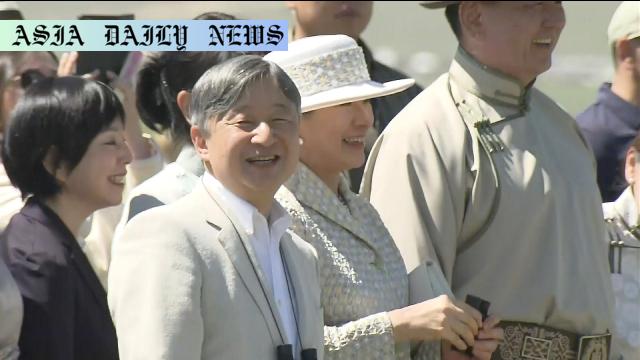Mongolia: Japan’s Emperor and Empress deeply explored Mongolia’s history, culture, and traditions during their eight-day visit.
Key Point 1: Emperor Naruhito and Empress Masako engaged with Mongolian tradition and culture during an eight-day visit.
Key Point 2: The Imperial couple attended the Naadam festival and observed historical horse racing practices.
Key Point 3: They visited Hustai National Park to see the Takhi, a wild horse species restored to its natural habitat.
Key Point 4: Emperor Naruhito highlighted Mongolia’s rich culture, youth interest in Japan, and their aspirations to study in Japan.
Key Point 5: Their visit signified strengthened relations between the two nations and mutual appreciation of heritage and learning.

Introduction: A Diplomatic Journey to Deepen Cross-Cultural Relations
The recent visit of Japan’s Emperor Naruhito and Empress Masako to Mongolia marked a significant chapter in fostering ties between the two nations. Their eight-day visit was filled with moments that celebrated the cultural richness, natural beauty, and the enduring friendship between Mongolia and Japan. From attending traditional festivals to connecting with the local youth, the Imperial couple immersed themselves in the heart of Mongolian heritage. This article delves into the highlights of their journey, reflecting on the deeper implications of such diplomatic engagements.
Experiencing Mongolian Culture at the Naadam Festival
The visit commenced with the Imperial couple participating in the Naadam Festival, a traditional event that showcases Mongolia’s vibrant sporting culture. Held annually, the festival features traditional sports such as horse racing, archery, and wrestling. Emperor Naruhito and Empress Masako were warmly received by Mongolian President Ukhnaa Khurelsukh and his wife. Witnessing over 100 child jockeys race across a 22-kilometer grassy course offered the couple a firsthand view of the deep-rooted equestrian traditions of Mongolia, a nation known for its nomadic heritage. Their presence at such a significant event symbolized respect and admiration for Mongolian customs.
Discovering the Takhi at Hustai National Park
Another highlight of the visit was the couple’s trip to Hustai National Park, renowned for its conservation efforts. The park is home to the Takhi, one of the oldest species of wild horses, which was declared extinct in the wild during the 1960s. However, extensive efforts have been made to reintroduce the Takhi to its natural habitat. The Emperor and Empress learned about these conservation endeavors and observed the Takhi in their restored environment. This visit underscored Japan’s commitment to environmental preservation and the shared global responsibility to protect endangered species.
Engaging with Mongolian Youth
During the visit, Emperor Naruhito emphasized engaging with local youth who expressed a keen interest in Japan. Many shared their aspirations to visit or study in the country, highlighting the cultural and educational bonds that connect the two nations. These interactions symbolized the importance of nurturing cross-cultural understanding and building bridges for the next generation. Such dialogues reflect how diplomacy can inspire youth to contribute positively to international relations.
A Reflection of Friendship and Cooperation
Throughout their visit, the Imperial couple was consistently met with warmth and hospitality from the people of Mongolia. In his reflection, Emperor Naruhito praised the nation’s rich history, breathtaking landscapes, and deep cultural values. Their journey not only celebrated the strong ties between Mongolia and Japan but also demonstrated the impact of cultural exchange in promoting mutual respect and admiration. Diplomatic visits such as these serve as reminders of how shared traditions and open dialogues can bring nations closer together.
Conclusion: Strengthening Bilateral Relations Through Cultural Diplomacy
The eight-day visit of Emperor Naruhito and Empress Masako to Mongolia was a testament to the enduring friendship between the two countries. By engaging with the nation’s unique traditions and fostering meaningful connections, the Imperial couple demonstrated the transformative power of diplomacy. Highlighting issues such as environmental conservation and cross-cultural education, their journey serves as a beacon of hope for stronger ties and global cooperation in the future.
Commentary
Embracing Cultural Diplomacy in Modern Relations
The visit of Japan’s Imperial couple to Mongolia serves as a reminder of the importance of cultural diplomacy in today’s increasingly interconnected world. Diplomatic journeys like these go beyond formal meetings; they allow leaders to immerse themselves in traditions and values that define a nation. Through their engagement, the Emperor and Empress demonstrated the mutual respect that is essential for fostering strong, lasting relationships between countries.
A Celebration of Shared Heritage and Environmental Stewardship
One of the most inspiring aspects of the visit was the couple’s exploration of the Takhi, the ancient wild horse species, at Hustai National Park. This reflects a shared global commitment to conserving nature and protecting endangered species. By highlighting this endeavor, the Imperial couple brought attention to environmental sustainability—a cause that unites individuals, communities, and countries in collective responsibility.
Nurturing the Next Generation
Of particular note was Emperor Naruhito’s interaction with Mongolian youth. Their interest in Japan reflects the deep admiration and curiosity that exists between cultures. Encouraging these connections builds a foundation for the future, where mutual understanding and cooperation can flourish. This exchange of ideas and aspirations underscores the profound impact of soft power in diplomacy.
Strengthening Relationships Through Mutual Admiration
Ultimately, this visit encapsulated the spirit of unity, respect, and shared humanity that defines the relationship between Mongolia and Japan. By participating in local traditions and engaging with people on a personal level, Emperor Naruhito and Empress Masako reinforced the idea that true diplomacy is not just about politics—it’s about celebrating what makes us human. Their journey is a compelling example of how cultural exchanges can pave the way for stronger relationships and a brighter future.


